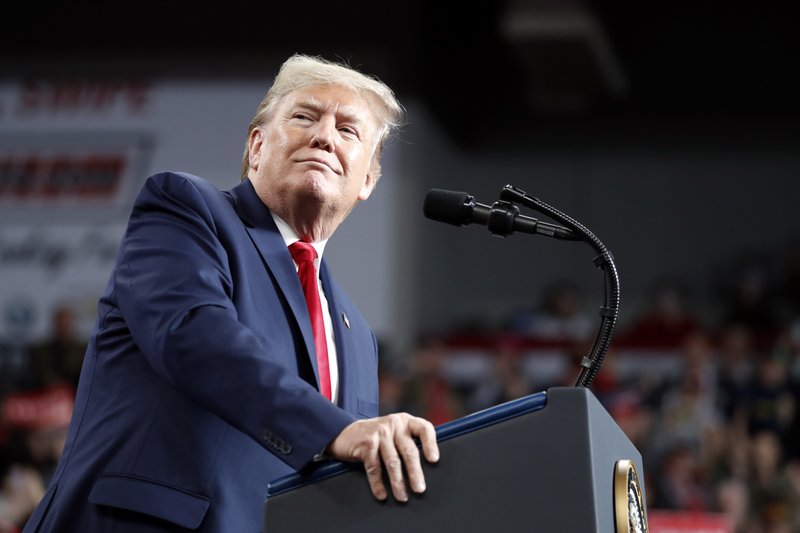WASHINGTON -- The White House is considering dramatically expanding its travel ban to additional countries amid a renewed focus on immigration by President Donald Trump, according to six people familiar with the deliberations.
A document outlining the plans -- timed to coincide with the third anniversary of Trump's January 2017 executive order -- has been circulating at the White House. But the countries that would be affected if it moves forward are blacked out, according to two of the people, who spoke to The Associated Press on condition of anonymity because the measure has yet to be finalized.
It's unclear how many countries would be included in the expansion if it proceeds, but two of the people said that seven countries -- a majority of them Muslim -- would be added to the list. The most recent iteration of the ban includes restrictions on five majority-Muslim nations: Iran, Libya, Somalia, Syria and Yemen, as well as Venezuela and North Korea.
A different person said the expansion could include several countries that were covered in the first iteration of Trump's ban but later removed amid rounds of contentious litigation. Iraq, Sudan and Chad, for instance, had originally been affected by the order, which the Supreme Court upheld in a 5-4 vote after the administration released a watered-down version intended to withstand legal scrutiny.
Trump, who had floated banning all Muslims from entering the country during his 2016 campaign, criticized his Justice Department for the changes, tweeting that the department "should have stayed with the original Travel Ban, not the watered down, politically correct version they submitted to S.C."
The countries on the proposed expansion list include allies that fall short on certain security measures. The additional restrictions were proposed by Department of Homeland Security officials after a review of security protocols and "identity management" for about 200 countries, according to the person.
White House House spokesman Hogan Gidley declined to confirm the plan, but praised the travel ban for making the country safer.
"The travel ban has been very successful in protecting our country and raising the security baseline around the world," he said in a statement. "While there are no new announcements at this time, common-sense and national security both dictate that if a country wants to fully participate in U.S. immigration programs, they should also comply with all security and counter-terrorism measures -- because we do not want to import terrorism or any other national security threat into the United States."
Several of the people said they expected the announcement to be timed to coincide with the third anniversary of Trump's first travel ban, which was announced without warning on Jan. 27, 2017 -- days after Trump took office. That order sparked an uproar, with protests across the nation and chaos at airports where passengers were detained.
The current ban suspends immigrant and nonimmigrant visas to applicants from the affected countries, but it allows exceptions, including for students and those who have established "significant contacts" in the U.S.. And it represents a significant softening from Trump's initial order, which had suspended travel from Iraq, Iran, Libya, Somalia, Sudan and Yemen for 90 days, blocked refugee admissions for 120 days and suspended travel from Syria.
That order was immediately blocked by the courts, prompting a monthslong effort by the administration to develop clear standards and federal review processes to try to withstand legal muster. Under the current system, restrictions are targeted at countries that the Department of Homeland Security says fail to share sufficient information with the U.S. or haven't taken necessary security precautions, such as issuing electronic passports with biometric information and sharing information about travelers' terror-related and criminal histories.
Under the existing order, Cabinet secretaries are also required to update the president regularly on whether countries are abiding by the new immigration security benchmarks. Countries that fail to comply risk new restrictions and limitations, while countries that comply can have their restrictions lifted.
Trump ran his 2016 campaign promising to crack down on illegal immigration and spent much of his first term fighting lawsuits trying to halt his push to build a wall along the southern border, prohibit the entry of citizens from several majority-Muslim countries and crack down on migrants seeking asylum in the U.S., amid other measures.
Just this week, a coalition of leading civil rights organizations urged House leaders to take up the No Ban Act, legislation to end Trump's travel ban and prevent a new one.
Information for this article was contributed by Matthew Lee and Colleen Long of The Associated Press.
A Section on 01/11/2020
